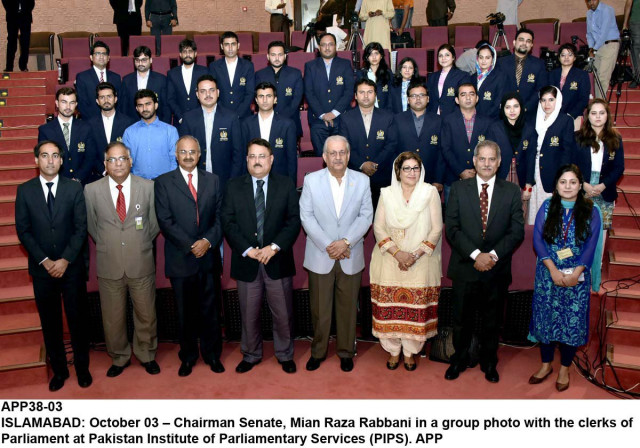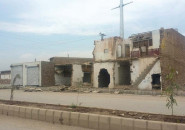Empower Senate, make federation stronger: Rabbani
Says Pakistan’s future lies in democracy and the parliamentary system

Mian Raza Rabbani in a group photo with the clerks of Parliament of Pakistan Institute of Parliamentary Services.
PHOTO: APP
Speaking at the inaugural ceremony of clerks of parliament at Pakistan Institute of Parliamentary Services, he said that the Constitution required close coordination between the provinces and the upper house.
Citing constitutional conventions, he said that it even allowed members of provincial assemblies and even chief ministers to present their issues in the upper house, adding that this was the norm in advanced democracies.
According to him, the federation cannot run while keeping the upper house in isolation.

Earlier, Rabbani said that Pakistan’s future lay in democracy and the parliamentary system and anyone who differed with this mindset was deluded.
The Senate chairman said that any effort to weaken the democratic process and constitutional parliamentary system would pose a threat to the federation’s integrity.
A strong parliamentary administration could augment the parliamentary system in the country, he maintained.
Furthermore, he said that the concept of the clerks of parliament was not new in parliamentary democracy across the world, but it had been introduced in the Senate for the first time.
Youth, he said, inducted via a transparent process would pave the way for a strong parliamentary administration.
Citing past examples, he said that elements had made conscious efforts for keeping parliament isolated from the people of Pakistan.
After the adoption of the 18th Amendment, Pakistan had become a true federation, but this constitutional development also called for empowering the Senate.
He said that in the joint sitting of parliament, the upper house, representing all the federating units, loses this importance because of the vote count: the number of votes cast by the Senate is even less than the votes of Punjab in the National Assembly.
He feared that if a fresh census was held, the National Assembly’s votes would further increase, crossing the figure of 400, much higher than 104 members of the Senate in the joint sitting of parliament.
He said that in this context, the Senate became conceptually useless, adding that the makers of the 1973 Constitution would be turning in their graves over this situation.
Published in The Express Tribune, October 4th, 2016.


















COMMENTS
Comments are moderated and generally will be posted if they are on-topic and not abusive.
For more information, please see our Comments FAQ